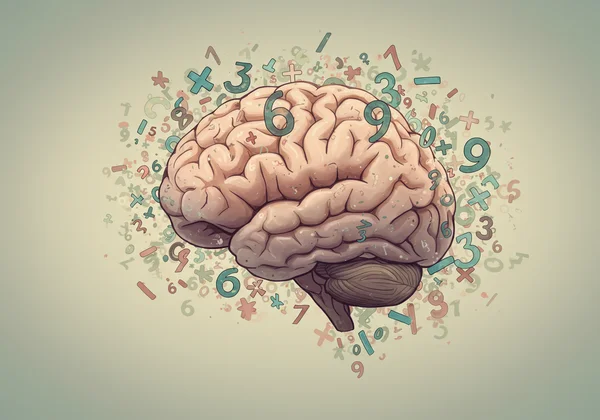What is Dyscalculia? Get Tested & Find Support
November 11, 2025 | By Aisha Bennett
Are numbers a constant source of frustration? Do you or your child struggle with basic math concepts, even after repeated attempts? You're not alone. This guide will demystify dyscalculia, a specific learning difficulty that affects numerical abilities. We'll offer clarity on the signs, paths to support, and how a dyscalculia test can be your first step toward understanding. Do you have dyscalculia or are you just bad at math? Let's find out together and explore how our online dyscalculia screening can illuminate the path forward.
What Exactly is Dyscalculia?
Dyscalculia is often called "math dyslexia," but it's a distinct condition. It is a specific and persistent difficulty in understanding numbers which can affect people differently and at various stages of life. This neurodevelopmental learning difference is not related to intelligence or a lack of effort. Instead, it originates from differences in the brain structures that process numerical information.
Individuals with dyscalculia struggle to grasp core number concepts, a faculty often referred to as "number sense." This can make everything from simple arithmetic to more complex mathematical reasoning feel like an insurmountable challenge. It's crucial to understand this: your struggle isn't a personal failing, but a manageable learning difference.

Dyscalculia vs. Math Anxiety: Understanding the Difference
It's vital to distinguish between dyscalculia and math anxiety, though they can coexist. Math anxiety is an emotional response—a feeling of tension, fear, or apprehension that interferes with math performance. In contrast, dyscalculia is a cognitive difficulty with processing numerical information itself.
Someone with math anxiety might understand the concepts but freezes up during a test. A person with dyscalculia struggles with the foundational concepts from the start. Recognizing which one is the primary issue, or if both are present, is a key step toward finding the right support.
Common Misconceptions About Math Learning Difficulties
Several myths surround math struggles, creating barriers to support. Many incorrectly believe that struggling with math is a sign of laziness or low intelligence. This is simply untrue. Dyscalculia is a legitimate learning difference, just like dyslexia.
Another common misconception is that it's a condition only affecting children. In reality, many adults live with undiagnosed dyscalculia, facing daily challenges in their careers and personal lives. Acknowledging these truths helps create a more supportive environment for everyone. If you suspect this might be you, a free online dyscalculia test is an excellent starting point.
Recognizing the Signs: Dyscalculia Symptoms by Age
The signs of dyscalculia can manifest differently depending on age and developmental stage. Identifying these indicators is the first step toward getting the right help.
Early Warning Signs in Children (Ages 7-12)
For young children, the signs often appear as they learn foundational math skills. A concerned parent might notice their child has persistent trouble with:
- Learning to count, especially backward.
- Recognizing printed numbers or connecting them to amounts.
- Remembering basic math facts, like 2 + 3 = 5.
- Using finger counting long after peers have stopped.
- Telling time on an analog clock.
These early warning signs are not about being a little behind; they represent a consistent and significant gap compared to their peers.

Challenges for Teenagers with Dyscalculia
As math becomes more abstract in middle and high school, the challenges for teenagers with dyscalculia evolve. They may struggle with:
- Understanding graphs, charts, and maps.
- Applying math concepts to word problems.
- Grasping higher-level concepts like algebra and geometry.
- Managing their money or keeping track of scores in games.
This can lead to significant academic frustration and a loss of confidence. A dyscalculia screening can help clarify if a learning difference is at the root of these struggles.
Adult Dyscalculia: Hidden Struggles & Everyday Impact
Many adults have battled math difficulties their entire lives without knowing why. The impact of adult dyscalculia is felt daily and can be a source of hidden shame and anxiety. Common challenges include:
- Difficulty with budgeting, balancing a checkbook, or calculating a tip.
- Trouble estimating distances or how long a task will take.
- Anxiety when a job requires working with spreadsheets or data.
- Following step-by-step directions or recipes that involve measurement.
Understanding the root cause can be incredibly validating and is the first step toward finding effective coping strategies.
The Path to Understanding: Dyscalculia Testing & Assessment
If these signs resonate with you, the next step is to seek clarity. A dyscalculia assessment can provide the insights needed to move forward with confidence and a clear plan.
Why Online Screening is Your Essential First Step
For many, the idea of a formal evaluation can be intimidating. That's why an online screening is such a valuable and empowering first step. It offers a private, accessible, and pressure-free way to explore your concerns.
The online screening tool is designed by educational psychologists and math experts to identify common patterns associated with dyscalculia. It provides immediate feedback on your potential tendencies, giving you a solid foundation of understanding before deciding on further steps.

What to Expect from a Formal Dyscalculia Diagnosis
It is essential to remember that an online screening is a supportive tool, not a formal diagnosis. A formal diagnosis must be conducted by a qualified professional, such as an educational psychologist. This comprehensive evaluation typically involves a series of standardized tests that assess various cognitive and mathematical abilities.
The results of a formal diagnosis can be used to secure official accommodations in academic and professional settings. Our online screening can provide valuable data and insights to share with a professional during this process.
How Our Platform Provides Personalized Insights
Our platform offers something beyond a simple score. After completing the free test, you have the option to receive a personalized AI-powered analysis. This report provides a detailed cognitive profile, outlining your potential strengths and weaknesses related to number processing.
It translates your results into actionable advice, offering tailored strategies and resources to help you or your child navigate mathematical challenges. This level of personalized insight empowers you to take targeted, effective action. Get your results and start your journey.
Strategies & Support: Living and Learning with Dyscalculia
An indication of dyscalculia isn't a finish line; it's a powerful first step on your journey toward empowerment. With the right strategies, individuals can thrive.
Effective Classroom Accommodations for Educators
Educators are on the front lines of supporting students with learning differences. Some effective classroom accommodations include:
- Allowing the use of a calculator and multiplication charts.
- Providing graph paper to help align numbers and problems.
- Using visual aids and real-world examples to teach concepts.
- Granting extra time for tests and assignments involving math.
Practical Home-Based Support for Parents
Parents can create a supportive learning environment at home. Focus on making math a positive and practical part of daily life through home-based support:
- Play board games that involve counting and strategy.
- Involve your child in cooking and baking, which uses measurement.
- Connect math to their interests, like sports statistics or music.
- Celebrate effort and progress rather than focusing solely on correct answers.
Tools and Resources for Adults Managing Dyscalculia
For adults, leveraging technology and practical tools can make a significant difference. Consider using:
- Budgeting and finance apps to manage money.
- Calculator apps on your phone or smartwatch for quick calculations.
- Conversion apps for measurements and other units.
- GPS for estimating travel time and distance.
Finding the right tools builds confidence and reduces the daily cognitive load.

Empowering Your Journey: Understanding & Overcoming Dyscalculia
Understanding dyscalculia is the most powerful tool you can have. It transforms confusion into clarity, and anxiety into action. Whether you are a parent seeking answers for your child, an adult reflecting on a lifetime of challenges, or an educator looking to support your students, know that progress is possible. The journey begins with a single step.
Are you ready to gain clarity and find the support you deserve? Take the free dyscalculia test today and unlock the personalized insights that can change your relationship with numbers forever.
Frequently Asked Questions About Dyscalculia & Testing
Is there a reliable online test for dyscalculia?
Yes, a high-quality online screening can be a very reliable first step. While not a formal diagnosis, a tool like our expert-designed online test is designed by experts to accurately identify tendencies and patterns associated with dyscalculia, providing valuable initial insights.
What are the main signs of dyscalculia in adults?
The main signs in adults often revolve around everyday tasks. This includes significant difficulty with managing personal finances, calculating tips, measuring ingredients for a recipe, and understanding data or spreadsheets at work. Many also struggle with remembering phone numbers or keeping track of time.
How is dyscalculia different from just being "bad at math"?
Being "bad at math" is often a temporary struggle, a lack of interest, or the result of poor instruction. Dyscalculia, however, is a persistent, neurodevelopmental difference. It involves a fundamental difficulty with number sense and processing numerical information, which doesn't improve simply with more practice on the same material.
What is the next step after an online dyscalculia screening?
After taking an online screening, a great next step is to discuss the results with a trusted professional. This could be a teacher, a school counselor, a doctor, or an educational psychologist. The report from our online assessment can serve as an excellent starting point for that important conversation.